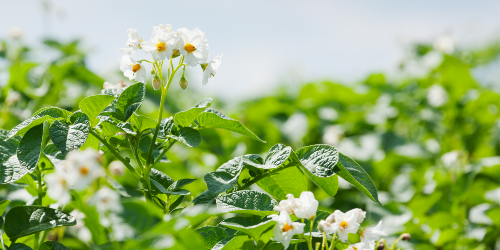Potato is one of the primary crops worldwide (4th after rice, maize and wheat). It is cultivated in most countries of the world.
Until the end of the 1980s, it had a similar position in Poland. Today, the area of its cultivation has significantly decreased in favor of specialization in a specific direction of use for this plant. Hence, the goal in potato cultivation, apart from ensuring high yield, is to obtain tubers of high quality, defined by the production's purpose. The potato prefers lighter, well-ventilated soils with a regulated groundwater level (it does not like excessively moist, drainable and excessively dry soil - it has a relatively shallow root system). An important thing in potato cultivation is the right pH, preferably in the range of 5.5-6.5. Too low pH limits growth and reduces the yield, while too high pH increases infection with a common scab, which reduces the yield and, above all, significantly worsens quality.
Due to the yields obtained, the nutritional needs of potatoes do not differ quantitatively from the needs of plants considered demanding in this respect (rapeseed, wheat). Given the above aspects, obtaining the expected yield requires additional foliar nutrition. Research shows that using foliar fertilizers not only directly affects the yield, but also reduces infection by some fungi, and the combined use of fertilizers with fungicides allows reducing the cost of the treatment.
The nutritional requirements of potatoes, and thus the selection of appropriate foliar nutrition, depending on the purpose the plant's yield is to be used.
The main source of nutrients is soil, which contains organic and mineral substances as well as soil fertilizers. Potatoes are very often grown on manure (they use this fertilizer very well), which should be taken into account when calculating the number of fertilizer doses. However, the proper level of plant nutrition, taking into account the constraints in nutrient uptake, can be achieved by supplementing the process with foliar feeding - this particularly applies to the micronutrients responsible for the quality of the yield obtained.
Potassium plays a special role in yielding potatoes, which translates into the plants' strong reaction to fertilization with this component. Yield-forming effects of potassium:
- increase in total yield,
- increase in the average size of tubers and a decrease in the tendency to deformation,
- reduced susceptibility to damage,
- reducing the tubers' tendency to darken,
- improved color of fries,
- improvement of tuber storage properties.
Foliar nutrition of potatoes is aimed at providing the essential nutrients for this plant in the periods of critical demand. In order to fully use the potato's yielding potential, foliar feeding should be a permanent element of this plant's agricultural practices.
The first treatment in the shoot formation stage is based on MAXIMUS Platinum extra PK. This fertilizer provides easily digestible phosphorus (a carrier of energy conversions), which supports the root expansion process and replenishes potassium. The fertilizer additionally contains a significant amount of boron (20g per 1kg), a micronutrient of key importance in the fertilization of potatoes. MAXIMUS Platinum extra PK is supplemented by adding MAXIMUS AminoMicro Maize/Potato in the same treatment.
This fertilizer, containing the entire range of micronutrients complexed with glycine, contains an increased level of zinc and manganese. Such a composition fully covers the potatoes' increased demand for basic nutrients.
Two subsequent treatments applied during the closing of inter-rows and at the beginning of flowering provide mainly potassium - MAXIMUS Platinum extra K and micronutrients from MAXIMUS AminoMicro Maize/Potato. In intensive plantations, or in the case of deficiencies of one of the micronutrients, foliar feeding can be enriched with one of the micronutrients: boron or zinc (EKOLIST mono Boron or EKOLIST mono Zinc). The best fertilization results are obtained by using additional micronutrients in the early development stages (until the inter-row closure stage).
Fertilization technologies
Taking into account the different expectations of farmers in terms of crop nutrition, we have prepared for you three complete proposals for foliar fertilization.
The following technologies have been prepared in response to these expectations, in order to optimally nourish the crop and are for reference. If you have any questions regarding the details of the technology and the adjustment of the individual dosage of the indicated products, we invite you to contact our Team.
















